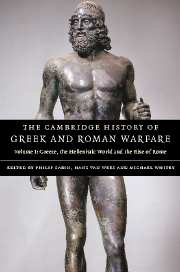Book contents
- Frontmatter
- Introduction: The Historiography of Ancient Warfare
- Part I Archaic and Classical Greece
- Part II The Hellenistic World and the Roman Republic
- 10 International relations
- 11 Military forces
- 12 War
- 13 Battle
- 14 Warfare and the state
- 15 War and society
- Chronological Table
- Glossary
- List of Ancient Authors
- Bibliography
- Index of ancient passages cited
- General index
- Map 1 The western Mediterranean
- Map 3 The Near East
- References
15 - War and society
from Part II - The Hellenistic World and the Roman Republic
Published online by Cambridge University Press: 28 March 2008
- Frontmatter
- Introduction: The Historiography of Ancient Warfare
- Part I Archaic and Classical Greece
- Part II The Hellenistic World and the Roman Republic
- 10 International relations
- 11 Military forces
- 12 War
- 13 Battle
- 14 Warfare and the state
- 15 War and society
- Chronological Table
- Glossary
- List of Ancient Authors
- Bibliography
- Index of ancient passages cited
- General index
- Map 1 The western Mediterranean
- Map 3 The Near East
- References
Summary
introduction
Peloponnese stretches three ambitious fingers towards the coast of Africa. Taenarum is the middle cape, and the longest, a terror to mariners despite the pleading temple to Poseidon set upon its rocky tip. And in the years after the death of Alexander the Great, this crag redoubled its evil fame as a hiring fair for mercenary soldiers. Here that breed of ‘exiles, deserters, a congeries of evil-doers’ (Isoc. 8.44) awaited those who came to bid for their services, thrust into the sea as far from respectable hearths as geography allowed. And to Taenarum bidders came, for despite their dark reputation mercenaries were ubiquitous in the armies of the Hellenistic world: sometimes whole hosts were hireling, or nearly so; often mercenaries formed the corps in which most confidence was placed; rarely were they absent.
Yet a mercenary arriving in Latium would despair of his reward. In the middle Republic, when the Romans traded a parochial sway in Italy for lordship of the Mediterranean world, they employed mercenaries only rarely. This contrast between the Greek world and Rome betrays the dissimilarity of their military cultures, the different ways Greeks and Romans thought about the nature of military prowess. The Hellenistic Greeks, although they valued inborn courage, were inclined to regard soldiering as a learned craft, while the Romans, although they accepted that there was much to learn about warfare, were more apt to think that fighting displayed inherited virtue. This disparity of outlook is a matter of delicate shading rather than stark contrast, but it has consequences for the evolution of military technique, the harmony of society and the incidence of war.
Keywords
- Type
- Chapter
- Information
- The Cambridge History of Greek and Roman Warfare , pp. 498 - 516Publisher: Cambridge University PressPrint publication year: 2007
References
- 1
- Cited by

